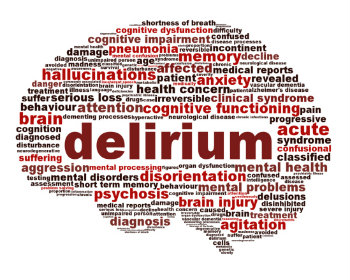 Two years ago, I wrote a blog titled Confused About Post-Operative Confusion about my father’s experience with post-op delirium after he had triple bypass surgery. It obviously struck a chord with many.
Two years ago, I wrote a blog titled Confused About Post-Operative Confusion about my father’s experience with post-op delirium after he had triple bypass surgery. It obviously struck a chord with many.
Even now, it consistently remains one of the most-visited pages on our website, and has drawn 26 comments from people who are caregivers themselves and whose relatives experienced symptoms of delirium similar to my father. And more comments continue to be posted even after two years. Usually our blogs receive comments from grantees/policy people, professionals, etc. It is less common that our blogs reach caregivers.
What we’ve discovered is that there are many caregivers and others faced with similar circumstances who are hungry for information on post-op delirium and are finding my blog post through various internet search engines.
In response, we have added links at the top of my original blog post to our resources for older adults as well as information from other organizations on delirium.
Each of the comments we’ve received from caregivers state that their loved one, who was at least over age 65, experienced delirium after surgery. All of these personal stories mention three things:
- Their loved one was extremely confused and combative after the surgery—behavior that had not been exhibited before surgery.
- No one—not the doctor, not the surgeon, not the anesthesiologist—explained beforehand that delirium could be a post-op outcome, nor did they offer any explanation or intervention after the surgery.
- Each of the caregivers were frustrated, scared, and felt helpless as to how to explain the change in their loved one’s behavior. One commenter did report that the nursing staff was helpful in explaining that their father had delirium and that he would return to normal after a few days. In that case, the nurses’ prediction was true. However, for all of the other commenters, they reported that the delirium lasted weeks or months and that it had caused great distress for the caregivers and their loved one.
One of the biggest concerns reported was that their loved one was going to be discharged to a rehabilitation center after hip replacement surgery in a confused state. They worried that their father or mother would fall and also that the staff at the rehab would not be able to handle their loved one in a confused state and would make matters worse.
In several comments, caregivers reported that their loved one received medicine to control the combative behavior, which only caused their relative to become more confused and to experience hallucinations.
All of the caregivers asked why they weren’t provided with adequate information before and after the surgery that would have explained the possible outcomes of confusion or delirium and also would have told them what could be done about it. Each of the comments expressed incredulousness that the health care providers they encountered did not know about delirium or how to treat it. All of the caregivers who posted comments described their frustration with health care providers and their subsequent distrust of their medical care.
It is very unfortunate that these caregivers had such a bad experience with health care professionals regarding delirium. We at the John A. Hartford Foundation are working with professionals to help educate health care professionals and caregivers about delirium.
Next week, on Sept. 17 and 18, the American Geriatrics Society—through the Hartford-funded Geriatrics for Specialists Initiative—is convening an expert panel to develop best practice guidelines for surgeons, anesthesiologists, and other related specialists on the prevention, diagnosis, and treatment of delirium. Delirium was rated as one of the most vexing problems among these specialists in surveys conducted by the initiative.
And over the next year, this interdisciplinary panel, under the leadership of Drs. Sharon Inouye and Tom Robinson, will review available evidence and produce recommendations that will help specialists address this serious problem and provide better care to their older surgery patients.
Also, the American Delirium Society is preparing an educational module for their website that will inform health care professionals, caregivers, and older people on the issues of delirium.
Please stay tuned to Health AGEnda for announcements and additional information on delirium. And thanks to everyone who has taken the time to share their stories with us to help shed more light on this issue.
